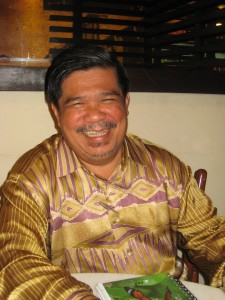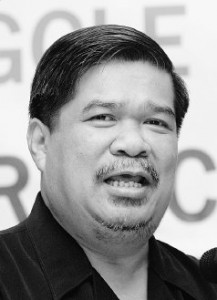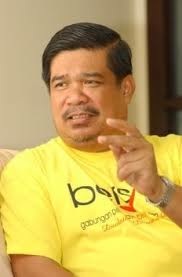DAP and PAS has certainly traversed a long and windy path to comradeship. PAS deputy president Mohamad Sabu or popularly known as Mat Sabu, savours the moment and speaks of challenges both parties need to overcome to sustain this relationship further.
For decades DAP and PAS were pigeonholed and stereotyped by UMNO-controlled media and propaganda as Chinese chauvinist (DAP) and Islamic fundamentalist (PAS) parties that are unsuited for Malaysia’s multi-racial environment. The common folks’ perception towards them was hard to shake. As BN’s corruption and image worsened both DAP and PAS, though principled and clean, were still unable to take on BN’s might on their own. Mat Sabu explains the predicament to The Rocket’s T. K Tan.
 “Both parties have to come to a common understanding and viewpoints and work together in order to be an effective challenge to BN. Though our first foray into active cooperation in the years 1999 to 2004 was botched by the arguments over the Islamic state issue, the external events from 2006 to 2008 and the people’s aspiration to see a common opposition takeover the country in the 2008 GE has brought us together.”
“Both parties have to come to a common understanding and viewpoints and work together in order to be an effective challenge to BN. Though our first foray into active cooperation in the years 1999 to 2004 was botched by the arguments over the Islamic state issue, the external events from 2006 to 2008 and the people’s aspiration to see a common opposition takeover the country in the 2008 GE has brought us together.”
Mat Sabu continues, “Though we may sometimes have different views and arguments on certain issues, that is normal. Both political parties have sizable memberships and followings and also have different ideologies and viewpoints. However we are sure of one thing; for the people’s sake we have to unite to overcome this BN regime.”
These days both parties’ cooperation is more engaging. “In Kelantan, in some of the state PAS functions, DAP leaders are invited to give talks, even thought there may not be any non-Malays around. Likewise for DAP dinners and ceramahs, many PAS leaders are regularly invited to speak there.”
Even at the grass root level, the cooperation and unity is evident; grassroot DAP members are invited to buka puasa events at PAS suraus. “In my 32 years of politics I have not seen or would believed that such close cooperation between DAP and PAS was possible. It is unprecedented,” he enthused
Cultural differences
However before DAP and PAS can better leverage on their strengths, they face very different constituents’ demands and electioneering culture.
Mat Sabu narrates: “In the Chinese society where DAP has a strong appeal, the Chinese voters are issues based. The elected representative (YB) may not need to attend physically to his constituents regularly; however he is expected to speak up in the legislative assembly for the community and state or country. DAP does not need as many party members to reach out to the constituents.”
On the other hand, for the Malay community where PAS is strong, an elected representative has to appear regularly to touch base with his constituents. “Funerals, buka puasa dinners, community events and the like are almost compulsory events for the YBs. PAS needs a lot of members to be effective in reaching out to the Malay community. We need to be well-versed with each others’ constituent demands,” he elaborates.
The Chinese are sensitive towards national issues and corruption, whereas for the Malays the religious and communal issues take precedence. “For the Malays, since 1950s they have been inculcated mentally that UMNO is their protector, and the loss of its electorate is seen as erosion of their power.”
The media plays a major role in shaping their mindsets. As many Malays live in the rural areas where alternative media access is limited, UMNO’s propaganda has been effective in shaping their thinking. “In my ceramahs, I have said that it is easier for the Chinese voters to accept PAS than it is for DAP to penetrate the rural Malay majority areas. If I were to stand in Bukit Bintang as the PR candidate, I could beat the BN candidate handily. The same can’t be said for DAP in Malay constituencies,” he opined.
“In facing UMNO’s smear campaigns and diatribes, PAS often bears the brunt of erosion of support if it affects PR negatively. PAS, which contest most of the rural Malay seats, has to confront a sceptical and brainwashed constituency.”
“Firstly we have to convince PAS party members and the Muslim-Malay NGOs before reaching out to the broader Malay community. There is only a small Malay swing voter segment; however they still play a crucial role in deciding who wins the seat. PAS and UMNO have their core voters who will stay staunchly with their respective parties. The contest for Malay votes is neck to neck for both parties.”
“In addition we have the civil servant voter segment, which numbers more than a 1.2 million people. An overwhelming majority of them are Malays; they and their family members often vote BN out of coercion and indoctrination. Many reside in Malay majority areas,” he pointed out.
Hudud
A controversial subject that has haunted both parties’ past and present relationship is the issue of hudud (Islamic penal) law implementation. “PAS’s stance is steadfast that this is a revealed and divine law ordained by Allah and Muslims are to implement it. However, as we are in residing in a democracy, we will choose consultations and dialogues with the non-Muslims to allay their fears on the implementation of these laws,” he added.
He knows that this is a political minefield that both DAP and PAS have to carefully navigate through. “Both parties have to be careful with the polemics less it turns off the electorate. BN has been waiting gleefully for this opportunity. It is my sincerest hope that we will survive this storm. If we ever repeat the 2001 split-up, I will be the saddest person to see it happen, after all that we have built upon,” he said sombrely.
Mat Sabu expresses his satisfaction with what DAP have accomplished in running Penang. “DAP and Lim Guan Eng’s exemplary efforts in handling the state government’s finances has resulted in continuous budget surpluses. His government’s continuous effort at combating wastage and corruption in the state government is commendable,” he notes with approval.
“By choosing to economy class air travel for official assignments, living in his parents’ house while being a Chief Minister and riding in a hand-me down government vehicle, he has shown himself to be a humble and clean leader. In fact, despite being the CM of Penang, financially speaking I am better off than he is (laughs)!”
As for the fate of the Malays, DAP’s performance in Penang is scrutinised. “The Penang state government’s generous provision of assistance to the religious schools, teachers, mosques workers (imans and bilals), open tenders of its projects (that has been fairly won by an overwhelming number of Malay contractors) has exceeded the previous government’s performance,” he said.
However, DAP needs to improve publicity in this area. “In this aspect PAS also has to play an important role of informing its supporters and the Malay community of DAP’s achievements. It is for both sides’ benefit that DAP’s efforts in taking care of the Malay community be made known.”
Rewriting history
Mat Sabu’s citation of Mat Indera as an independence fighter seems to have unnerved UMNO and earned him much media attention. He has been charged in court for allegedly glorifying the communist guerilla who attacked the Bukit Kepong police station in 1950 and seeing attempted arson on his house. Here he broaches into a little-mentioned topic – history revisionism.
“In my past ceramahs, I had mentioned before about Mat Indera’s role as an independence fighter yet there was never a fuss about it. This incident is just another one of BN’s tactics to divert the public’s attention from the nation’s pressing issues. One has to remember that I mentioned about Mat Indera on 21 August 2011; Utusan Malaysia only picked it up on its 27 August edition. It seems there is a news spinning department in the government that is fine-combing all PR leaders’ verbal and press statements everyday to be used against us,” he said.
“The sense of national patriotism amongst the people is waning by the day. Not many people are flying Malaysian flags anymore compared with the past. Why is that so? It’s because there is no mention of other people’s role in obtaining independence. There is a lack of sense of inclusiveness amongst the people.”
Before Malaya obtained independence in 1957, Dr Burhanuddin Al-Helmi (PAS’s third party president), Ibrahim Yaakob (founder of Kesatuan Melayu Muda), S.A Ganapathy (founder of Pan-Malaya Federation Trade Union), Tan Cheng Lock (co-founder of All-Malaya Council of Joint Action and MCA) and many other independence fighters who struggled for Malaya’s independence and were jailed by the British colonialists. “Yet we don’t hear much about them in the television and the school textbooks,” he continued.
“Every year come Merdeka Day celebrations, only UMNO’s version of history is rolled out for the people’s viewing. We hear only of Dato Onn Jaafar’s and Tunku Abdul Rahman’s role in achieving the country’s independence. Showing the Bukit Kepong movie fits right into their agenda,” he said.
Tearing down prejudices
By attempting to suggest Mat Sabu’s acknowledgement of Mat Indera’s independence fighting role connotes his alliance with the communist guerrillas, UMNO had hoped to portray Mat Sabu as a communist sympathiser.
“For the Malays who have been indoctrinated that everything communists is evil, billing a person as a communist sympathiser is heretical.”
“Yet today many also know that Chin Peng, the ex-Malayan Communist leader, was credited as one of the anti-Japanese liberation fighters by the British and was awarded the Order of British Empire (OBE). I am not a communist sympathiser; they did commit many atrocities toward all races. However I believe every Malaysians has a right to know all the versions and truth of history to make a judgement for themselves,” he remarked.
History indoctrination is one of the means that UMNO has employed successfully to rouse the Malays to continually support it lest their preeminent position in the country is threatened by other races. In the Bukit Kepong movie, all the communist characters were Chinese while the police (authorities) are Malays. It is a subtle form of racial prejudice typical of UMNO’s play book.
Indeed this indoctrination has shaped the siege mentality prevalent amongst the Malay community. “UMNO often peddles the lie that its defeat will spell the demise of the Malays. In the last GE, in Terengganu where I was contesting, UMNO banners were put up against me that said ‘A vote for PAS is for DAP’s (i.e. Chinese) domination over the Malays.’ The irony is DAP did not even contest a single seat, parliamentary or state, in Terengganu.” He lost the 2008 parliamentary contest by 628 votes.
“The National Civics Bureau (BTN) and the federal information department are also continuing this myth-making task with the one million strong Malay civil servants. Many of the Malay youths still buy this lie. We are up against an insurmountable wall,” he said.
Acknowledging Others and Sabuism
 Touching on biased historical coverage, Mat Sabu notes the glaring omission of other races’ contributions to the country’s development and independence. “The Chinese community’s hard work and diligence in building the nation’s early infrastructure and contribution to society cannot be ignored. Throughout the country, PAS has often been the beneficiary of the Chinese community’s willingness to lend us their community halls when conducting ceramahs or party functions. Yet the authorities, supposedly Malay-dominated, often restricted us from using their facilities.”
Touching on biased historical coverage, Mat Sabu notes the glaring omission of other races’ contributions to the country’s development and independence. “The Chinese community’s hard work and diligence in building the nation’s early infrastructure and contribution to society cannot be ignored. Throughout the country, PAS has often been the beneficiary of the Chinese community’s willingness to lend us their community halls when conducting ceramahs or party functions. Yet the authorities, supposedly Malay-dominated, often restricted us from using their facilities.”
He also observed that the authority’s bias also affects religious history. “In my schooling days, for Islamic history, the first caliphs of Islam were given fair and human portrayals. Nowadays, these same caliphs seem to have a faultless gloss in the schools’ history books,” he elaborated.
However, a silver lining has emerged from the history controversy. History revisionism is now in vogue. UMNO’s attempt to cover up its questionable role in the Merdeka struggle has even seen some renowned professors pronouncing comical statements such as “Malaya was never colonised by the British”.
The former dean of Arts and Social Sciences of Universiti Malaya, Professor Datuk Mohamad Abu Bakar has remarked that, “many are now flocking to colloquial history forums and talks. Previously only a handful of attendees would come to these talks; in a recent Kota Bharu history forum with Mat Sabu, thousands turned up to hear about his views on history. He has reopened many historical debates, inciting a new phenomenon of Sabuism.”
Mat Indera
Mat Indera, whose real name was Muhd (Ahmad) Bin Indera, was a Malay nationalist that took up arms fighting the British after World War Two. Born in Batu Pahat, Johor, he began his profession as a religious teacher. The pre war years was an active time of Malay nationalism; his passion for Malaya led him to join the Malay Nationalist Party of Malaya (PKMM) and Angkatan Pemuda Insaf (API), the active independence fighting outfits then existing.
After PKMM was banned by the British in 1948 and seeing the Indonesian Revolution’s success in overthrowing the Dutch colonialist, Mat Indera decided to take up arms to fight for Malaya’s independence. Though not inclined to the communism, he fought doggedly alongside the communists.
He was to gain fame for leading the attack on the Bukit Kepong police station. Some accounts have it that he did not participate in the killings of the Malay policemen and even attempted to protect them. Nonetheless, it was to bestow notoriety on him as a communist terrorist. In 1953, after been betrayed by his cohorts and arrested by the British, he was hanged in the Taiping prison.
In 2004 the Johor state government listed Mat Indera as one of the nation’s independence fighter in its publication titled “Pengukir Nama Johor.” He is listed alongside the late Sultan Ismail and Tun Sulaiman Ninam Shah as one of the state’s heroes. -The Rocket




